
Can We Learn More by Trusting than by Not Trusting?
Most of us have been burned by misplaced trust. These experiences lead us to believe that people are too trusting.
But in fact we don't trust enough. A survey about trust in the United States has found that interpersonal trust, a measure (测量) of whether people think others are in general trust worthy is at its lowest in nearly 50 years.
If people are more trustworthy, why don't we trust more?
When you trust someone, you end up working out whether your trust is justified (证明合理) or not. A child next door asks if he can visit your place. If you accept you will find out whether or not he's a good neighbor. A classmate advises you to adopt a new reading method. If you follow the advice you will find out whether the new method works better than the one you were used to.
However, when you don't trust someone. You never find out whether you should trust them. If you don't invite the child over, you won't know whether he would have made a good neighbor or not. If you don't follow your classmate's advice, you won't know if the new method is in fact superior.
This information means that we learn more by trusting than by not trusting. Moreover, when we trust, we learn not only about specific persons, we learn more generally about the type of situations in which we should or shouldn't trust. We get better at trusting.
When our trust is disappointing, the coats are visible (明显的), and our reaction (反应) changes from trouble all the way to hopelessness. The benefit that we've learnt from our mistake is easy to overlook. However, the costs of not trusting someone we could have trusted are invisible. We won't know about the friendship we could have built if we don't let that child go into our place. We won't realise how useful some advice would have been if we don't use our classmate's tip about the new reading method.
Giving people a chance isn't only the moral (道德的) thing to do. It's also the smart thing to do.
1.The writer mentions the survey about trust in the United States in Paragraph 2 to show that ________.
A.Americans are popular B.the measure is unbelievable
C.interpersonal trust is important D.people are short of enough trust
2.We can ________ to make us get better at trusting.
A.try to refuse other people's help
B.change our feelings of disappointment
C.find out the balance between trust and mistrust
D.make a smart decision and give people a chance
3.What can we learn from the passage?
A.The friendship between friends is trustworthy.
B.The costs of mistaken mistrust are largely hidden.
C.We can get more from not trusting than from trusting.
D.It is unlikely that people are less trustworthy than before.
4.What is the writer's main purpose in writing this passage?
A.To stress we should trust other people.
B.To question all the experiences of misplaced trust.
C.To introduce some of the trust that can bring us benefits.
D.To discuss which situation we should or shouldn't trust in.
科目:初中英语 来源:2020年上海市虹口区中考二模英语试卷 题型:单选题
The story sounded quite familiar ________ me, and I got a little bored.
A.from B.for C.to D.with
查看答案和解析>>
科目:初中英语 来源:2020年重庆市北碚区九年级适应性考试英语试卷 题型:阅读单选
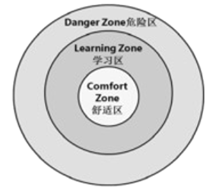
Comfort Zone is a state(状态)of mind where there is the least stress. However, stepping into the learning zone can help to bring out the best in us. Here are the reasons.
Challenging yourself can help you do at your best.
Stepping outside one's comfort zone is important to personal development. How can we expect to make ourselves better if we only stick to habit and routine(日常)? We should try something we might not succeed at.
Taking risks is what helps us grow.
As children, we're natural risk-takers. But as we get older and learn to fear failure(失败), we start trying fewer new things. We pay a heavy price for our fear of failure. There is no learning without some difficulty.
Facing new challenges can help us age better.
Our comfort zones seem to become smaller as we get older-but if we can keep expanding them, we'll open ourselves up to a greater world as we age. As we step into the learning zone, we will get more comfortable with the skills gradually and we'll start to move into the comfort zone. A study found that learning new life skills can help our brain stay sharp(敏锐的)as we get older.
However, don't push yourself too far. Have you heard of "Yerkes-Dodson Law”? It means performance increases as stress grows, but only up to a point. If the level of stress becomes too high, performance will go down. When stress becomes too great for us to deal with, we enter the danger zone.
1.Compared with the comfort zone, people in the learning zone may .
A.feel less stress B.face more challenges
C.make fewer efforts D.refuse more changes
2.From paragraph 3, we will learn more if we .
A.spend money B.fear failure C.take risks D.feel natural
3.The best title of the passage might be .
A.Comfort Zone Makes Us Safe
B.What Is Comfort Zone
C.Step Outside Comfort Zone
D.Never Fear Comfort Zone
4.“Yerkes-Dodson Law” can be described by Graph .
A.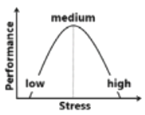 B.
B.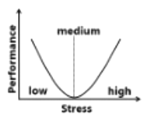
C.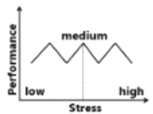 D.
D.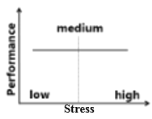
查看答案和解析>>
科目:初中英语 来源:2020年重庆市北碚区九年级适应性考试英语试卷 题型:听长对话回答问题
听一段材料,完成下面小题。
1.What did the man do yesterday?
A.He cut a tree.
B.He planted a tree.
C.He bought some apples.
2.Who will take the branches away from the street?
A.The man.
B.A tree company.
C.The city garbage service,
3.What does the man suggest about the woman?
A.She shouldn't eat the apples.
B.She should take some responsibility.
C.She should move out of the neighborhood.
4.What does the woman threaten to do?
A.Call the police.
B.Put the branches in his yard.
C.Charge the man some money.
查看答案和解析>>
科目:初中英语 来源:2020年重庆市北碚区九年级适应性考试英语试卷 题型:听短对话回答问题
What is the man doing?
A.Making a call. B.Writing an email. C.Playing computer games.
查看答案和解析>>
科目:初中英语 来源:2020年北京市通州区中考一模英语试卷 题型:单选题
— Can you tell me ________ now?
—No problem.
A.what did your hometown look like B.what your hometown looks like
C.what does your hometown look like D.what your hometown looked like
查看答案和解析>>
科目:初中英语 来源:2020年北京市通州区中考一模英语试卷 题型:单选题
Daming is one of ________ students in our school. He likes helping others.
A.popular B.more popular C.most popular D.the most popular
查看答案和解析>>
科目:初中英语 来源:2020年北京市大兴区中考一模英语试卷 题型:单选题
—Shall we go out for a walk, Betty?
—Sorry, I ________ my clothes now.
A.am washing B.washed C.have washed D.wash
查看答案和解析>>
科目:初中英语 来源:2020年天津市毕业生学业考试模拟(一模)英语试卷 题型:单选题
___________! I can't hear you clearly.
A.Go and ask B.Take care C.Remember D.Speak up
查看答案和解析>>
湖北省互联网违法和不良信息举报平台 | 网上有害信息举报专区 | 电信诈骗举报专区 | 涉历史虚无主义有害信息举报专区 | 涉企侵权举报专区
违法和不良信息举报电话:027-86699610 举报邮箱:58377363@163.com